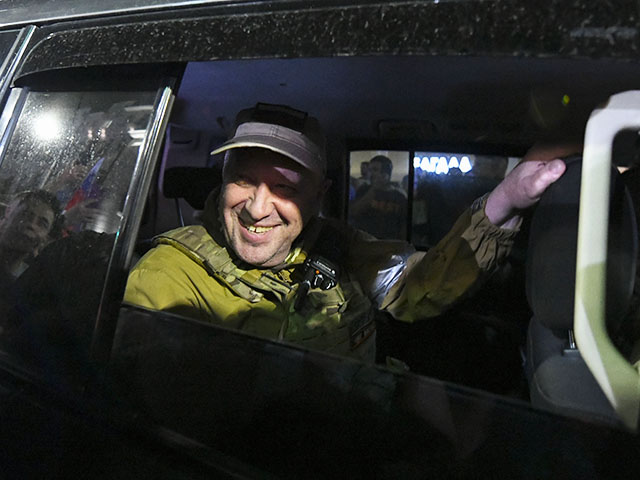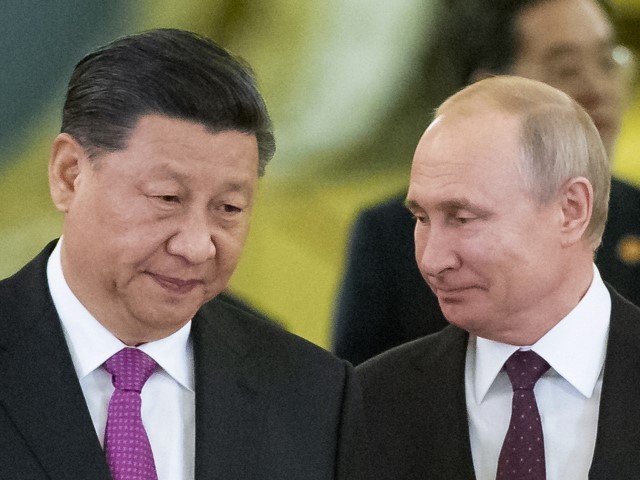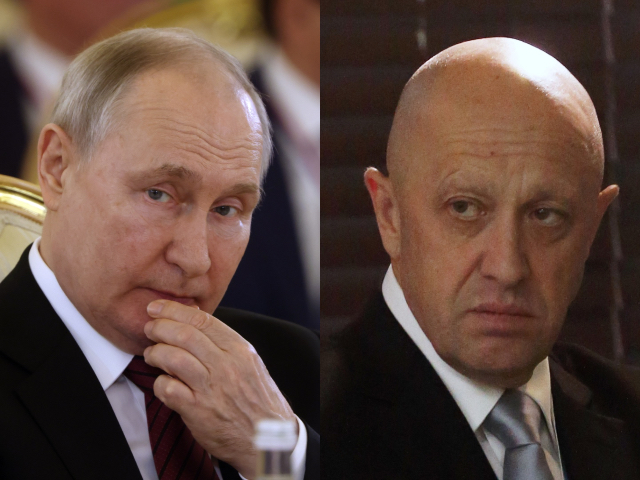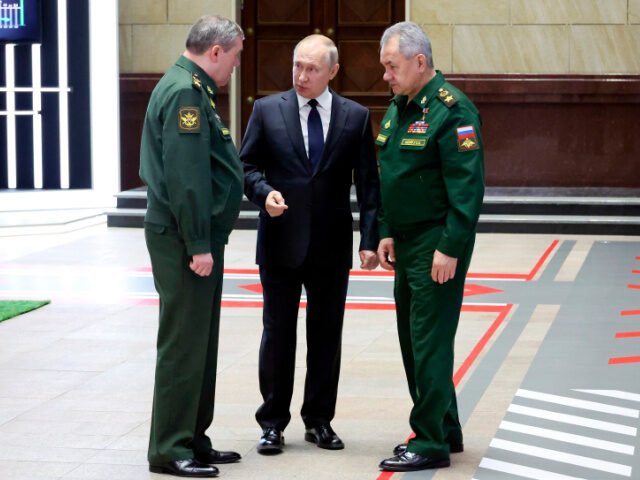Russian strongman Vladimir Putin on Friday pressured members of the federal lawmaking body, the Duma, to pass laws to address the existence of private military companies, a response to the brief attempted uprising by Wagner warlord Yevgeny Prigozhin.
The Wagner Private Military Company (PMC) is a mercenary organization that has worked in tandem with the Russian government for years in Syria, Ukraine, and throughout Africa. In late June, its leader, Prigozhin, announced that the Russian Defense Ministry had attacked his forces, allegedly killing 2,000 men, and that in response, he would march them out of Ukraine towards Moscow. The Russian government responded by charging Prigozhin with “armed uprising” and confiscating his assets.
Less than 24 hours later, following an intervention by communist dictator Alexander Lukashenko, Prigozhin halted the march and retreated to Belarus. Russian prosecutors dropped charges against Prigozhin and returned upwards of $111 million in gold, rubles, and other assets. Putin himself reportedly met with Prigozhin, an old friend and longtime ally, following the mutiny.

Head of the Wagner Group Yevgeny Prigozhin left the Southern Military District headquarters on June 24, 2023 in Rostov-on-Don, Russia. (Photo by Stringer/Anadolu Agency via Getty Images)
Prigozhin maintained throughout the affair that he had no conflict with Putin but was acting to preserve Wagner, repeatedly stating he was not staging a coup d’etat against Putin. He had spent months condemning the Russian Defense Ministry, and Defense Minister Sergei Shoigu personally, for mismanaging the invasion of Ukraine. After ending the “march for justice” to Moscow, Prigozhin claimed his troops had strolled into Russia with little resistance, the way Russian troops should have been able to seize Kyiv.
The Russian government has insisted that the conflict between the Russian military and Wagner has concluded and the affair proved Putin’s strength and popular support, but the ease with which Prigozhin almost seized Moscow startled foreign observers. Critical Russian allies such as China used their media arms to question Russia’s “stability” under Putin and his ability to maintain the invasion of Ukraine in the long term.

Chinese President Xi Jinping, center left, and Russian President Vladimir Putin, center right, enter a hall for talks in the Kremlin in Moscow, Russia, June 5, 2019. Amid the soaring tensions over Ukraine, President Vladimir Putin is heading to Beijing on a trip intended to help strengthen Russia’s ties with China and coordinate their policies amid Western pressure (Alexander Zemlianichenko, Pool, File/AP).
At the heart of concerns is the legitimacy of Wagner, a rogue paramilitary organization. Asked about the future of Wagner on Friday, Putin conceded that there are no laws in Russia regulating mercenary corporations – an oversight for which he appeared to blame the Duma.
“The [Wagner] Group exists, but it is judicially non-existent,” Putin told the newspaper Kommersant. “The formal legalization is a separate issue that should be addressed by the State Duma [the lower chamber of the Russian parliament] and the government. It’s a complicated issue.”
Elsewhere in his comments, Putin reportedly praised Wagner’s mercenaries for “fighting with dignity” and lamented that rank-and-file fighters “became embroiled into these events.” The Moscow Times reported that Putin suggested he was open to incorporating the mercenaries into the Russian military formally under a different leader than Prigozhin.
“All of them could have gathered in one place and continued to serve,” Putin reportedly said but claimed Prigozhin rejected the deal.
Some reports, including Kommersant itself, initially reported that Putin said Wagner did not exist, potentially as a response to the aborted mutiny. His extended comments appeared to clarify that he more specifically meant that Russian law does not offer the tools to legally create and maintain a paramilitary corporation.
Putin spokesman Dmitry Peskov attempted to elaborate on Putin’s comments on Saturday local time in Moscow, suggesting Putin was urging “further study” of the existence and legality of groups such as Wagner.
“The president said in response to a question from a Kommersant correspondent yesterday that the Wagner PMC had never existed as a legal entity and the issue required further study and consideration,” Peskov told reporters, according to the Russian news agency Tass. “At least, this issue will be considered.”
The Russian government has struggled to maintain some semblance of control over Wagner. Shortly after the uprising, Putin reportedly claimed that the Russian government fully funds Wagner.
“I want to note and I want everyone to know that the financing of the entire Wagner group was fully ensured by the state,” he said. “We fully financed this group from the Defense Ministry, from the state budget,” Putin told the Defense Ministry, according to Tass.
Tass claimed that the Russian government paid as much as $1 billion to Wagner for mercenary salaries and “incentive rewards” between May 2022 and May 2023, citing Putin.
Potential statutory regulations regarding paramilitary fighters and Putin’s claim that he offered Wagner mercenaries a chance to fight formally for Russia also appear directed at showing the world that Putin can exert control over warlords and their private armies, a significant concern following the Prigozhin uprising.
“The Wagner group’s coming into existence and growing into a strong force in Russia is something out of the ordinary,” Chinese professor Yu Sui told the Beijing propaganda outlet China Daily in June. “Maybe the incorporation of mercenaries into the Russian army was the best option for both the Russian government and the Wagner group, but it reminded of the Chinese saying about feeding a tiger and then inviting trouble.”
Peskov, the Kremlin spokesman, told reporters last week that Putin held a meeting with Prigozhin at some point after the uprising to discuss its aftermath, apparently an attempt to prevent any future mutinies. Peskov bizarrely claimed that Putin offered the Wagner leadership jobs within the Russian government despite its apparent attempt to overrun the Russian Defense Ministry.

Wagner’s Yevgeny Prigozhin (R) (Mikhail Svetlov/Getty Images) and Russian President Vladimir Putin (L) (Contributor/Getty Images)
“The only thing we can say is that the president gave an assessment of the company’s actions at the front line during the special military operation [in Ukraine], and also gave his assessment of the events of June 24,” Peskov explained. “Putin listened to the explanations of the commanders and offered them further employment options.”

COMMENTS
Please let us know if you're having issues with commenting.